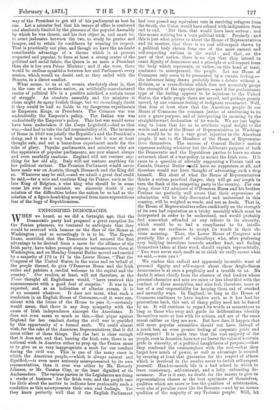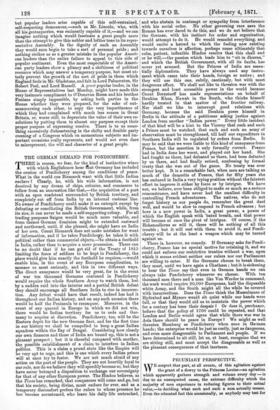UNDIGNIFIED DEMOCRACIES.
WHEN we heard, as we did a fortnight ago, that the Democratic party had prepared a great reception for the Fenian prisoners, we ventured to anticipate that they would be received with honour on the floor of the House at Washington ; and so accordingly it is to be. The Repub- licans, mortified that the Democrats had secured the first advantage to be derived from a move for the alliance of the Irish party, have taken prompt steps to outmanceuvre them at Washington, and on Monday General Butler moved and carried by a majority of 172 to 21 in the Lower House, " That the Congress of the United States, in the name and on behalf of, the people thereof, do give O'Donovan Rosso and the Irish exiles and patriots a cordial welcome to the capital and the country." Our readers, at least, will not therefore, as the Times thought all Englishmen would, " have received this announcement with a good deal of surprise." It was to be expected, and, as an indication of ulterior events, it is of no moment whatever. It does not mean, what such a resolution in an English House of Commons,—if it were con- sistent with the forms of the House to pass it,—certainly would mean, that there is any deep sympathy with the cause of Irish independence amongst the Americans. It does not even mean so much as this,—that pique against England for her conduct during the civil war is gratified by this opportunity of a formal snub. We could almost wish, for the sake of the American Representatives, that it did mean either of these things. But the fact is clear enough that it does not, and that, barring the Irish vote, there is no national wish in America either to prop up the Fenian cause or to give us so very inappropriate a snub for our conduct during the civil war. This is one of the many cases in which the American people,—which is always earnest and dignified,—is even more seriously misrepresented by its own representatives, than it ever was either by Mr. Reverdy Johnson, or Mr. Cassius Clay, or the least dignified of its Ambassadors. The various parties in the Legislature are doing a stroke of business ' for the Irish vote, and the people care too little about the matter to indicate how profoundly such a resolution as this misrepresents their own real feelings. Yet they know perfectly well that if the English Parliament had ever passed any equivalent vote in receiving refugees from the South, the Union would have echoed with indignation from end to end. But then, that would have been serious ; and this means nothing but a 'cute political trick.' Precisely ; and this is just what grieves us about the House of Representatives and its masters, that there is no real self-respect shown by a political body chosen from one of the most earnest and self-respecting nations in the world ; and that, on the part of that nation, there is no sign that they intend to exact dignity of demeanour and a principle of self-respect from the body which represents, or rather, on this head at least, continues to misrepresent, the people. Let our House of Commons only seem to be permeated by a certain feeling,— the inference being drawn probably from a debate without a division, or a cross-division which does not accurately gauge the strength of the opposite parties,—and if the predominant type of the feeling appears to be injurious to the United States, the whole people there are moved, and perhaps greatly moved, by one common feeling of indignant resentment. Well, that does at least show that the American people do our House of Commons the common justice of attributing to its acts a grave purpose, and of interpreting its meaning by the straightforward declaration of its words. We are just begin- ning to learn that for us to attribute equal weight to the words and acts of the House of Representatives in Washing- ton, would be to do a very great injustice to the American people, if not to the Members of the House of Representa- tives themselves. The success of General Butler's motion expresses nothing whatever but the deliberate purpose of both the Democratic and the Republican parties to leave no stone unturned, short of a war-policy, to secure the Irish vote. If it came to a question of officially supporting a Fenian raid on Canada, General Butler mould have no supporters at all, and therefore would not have thought of advocating such a step himself. But short of what the House of Representatives thinks a serious practical danger, they will go any length to turn the flank of the competing party in the country. For one thing, these 172 admirers of O'Donovan Rossa and his brother Fenians are perfectly well aware that their expressions of admiration will be duly discounted and understood in this country, will be weighed as words, and not as deeds. That is, the House of Representatives relies confidently on the strength of its own bad reputation as a tricky assembly which must be interpreted in order to be understood, and would probably- feel somewhat offended at any tribute to its sincerity, which would be so bad a compliment to its intelli- gence, as our readiness to accept its words in their ob- vious meaning. Thus, the Lower House of Congress acts precisely like a parcel of schoolboys who, after professing very bullying intentions towards another knot, and finding themselves taken at their word, should explain reproachfully, "You were never such muffs as to think we really meant what we said,—were you ? "
We confess this radical and apparently incurable want of personal dignity and self-respect about these Anglo-Saxon democracies is at once a perplexity and a trouble to us. No doubt it arises chiefly from the absence of real leaders whose personal character and acts are more or less identified with the conduct of these assemblies, and who feel, therefore, more or less of a real responsibility for keeping them out of crooked and unworthy ways. In England, so long as the House of Commons continues to have leaders such as it has had for generations back, this sort of sharp policy need not be feared by us. It will continue to regard its words as momentous so long as those who sway and guide its deliberations identify themselves more or less with its actions, and are of the same moral calibre as they are now. But how does it happen that still more popular assemblies should not have, instead of a much less, an even greater feeling of corporate pride and self-respect ? It is quite true that the vast majority of the people, even in America, have not yet learnt the value of a certain pride in sincerity, of a political haughtiness of purpose,—that they confound the commonplace with the real,—that they forget how much of power, as well as advantage, is secured by securing at least that guarantee for the respect of others which is involved in the resolve never to forfeit self-respect yourself. Hand-to-mouth life is a bad school in which to learn consistency, self-restraint, and a lofty, unbending de- meanour. Nor is it easy, no doubt, for the masses to give to representatives chosen as the best specimens of themselves, qualities which are more or less the qualities of aristocracies, —or else of peculiar races like the Romans,—and by no means qualities of the majority of any Teutonic people. Still, let
but popular leaders arise capable of this self-restrained, self-respecting demeanour,—such as Mr. Lincoln, who, with all his grotesqueries, was eminently capable of it,—and we can imagine nothing which would fascinate a great people more than the attempt to give this nobler and loftier tone to its repre- sentative Assembly. In the dignity of such an Assembly they would soon begin to take a sort of personal pride ; and nothing strikes us as a greater mistake in the popular Ameri- can leaders than the entire failure to appeal to this side of popular sentiment. Even the most respectable of the Ameri- can party leaders show a pliancy and a shiftiness of political resource which may answer a temporary purpose, but must ut- terly prevent the growth of the sort of pride in them which England feels in Mr. Gladstone, and felt in Lord Palmerston, Sir Robert Peel, and Lord Russell. A great popular leader, in the House of Representatives last Monday, might have made this very insincere compliment to O'Donovan Rossa and his brother Fenians simply impossible, by asking both parties in the House whether they were prepared, for the sake of out- manoeuvring each other, to copy the very impertinence of which they had complained with much less reason in Great Britain, or, worse still, to depreciate the value of their own re- solutions by putting them to almost any purpose except their proper purpose of expressing resolve. There is to us some- thing excessively disheartening in the shifty and flexible party cunning of a Congress which on momentous subjects and im- portant occasions really represents, and would not even dare to misrepresent, the will and character of a great people.































 Previous page
Previous page